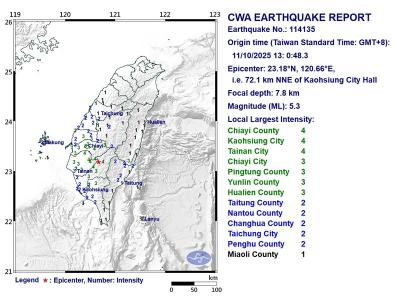A group representing caregivers yesterday called for public awareness of families dealing with long-term care burdens, while reassuring caregivers that support is available, after a family was found dead on Friday.
The Taiwan Association of Family Caregivers issued the call after a couple and their two children were found dead in a vehicle in Kaohsiung in what is believed to have been a murder-suicide.
The body of a 57-year-old man surnamed Chien (簡) was found in the driver’s seat when police arrived at the scene after receiving a report at about 8am.
Chien’s wife, 52, son, 24, and daughter, 11, were lying on the rear seat, possibly asphyxiated by exhaust fumes, police said.
No suicide note was found in the vehicle, and the case has been turned over to prosecutors and forensic investigators to determine the cause of death, police said.
The family was from a low to middle-income household that received NT$10,130 in subsidies per month, Kaohsiung Social Affairs Bureau employees said.
Chien, the sole breadwinner of the family, worked odd jobs while caring for his wife, who had cancer, while his son had epilepsy and his daughter had aphasia, Daliao District (大寮) Chief Huang Po-hsiung (黃伯雄) said.
His wife’s cancer might have been too much for Chien, association secretary-general Chen Ching-ning (陳景寧) said.
Tragedies among families in long-term care situations often result from a caregiver’s inability to take on additional burdens and their sense of desperation in the absence of social support, Chen said.
The association has identified 13 risk factors for recognizing overburdened family caregivers, it said, adding that people outside a family can help prevent similar tragedies.
The signs include: The caregiver has suicidal thoughts; is experiencing domestic violence; is in urgent need of medical treatment; is a patient themselves; has mental disorders; attends to a person with mental issues; or must care for two or more patients, especially when the patients are older.
Some caregivers do not have outside assistance or must take over from a domestic care worker who had been the primary caregiver, it said.
Others at risk are those who care for someone with Alzheimer’s disease or have been denied government aid, it said, adding that male caregivers in particular might need more support.
Surveys in Japan have found that male caregivers, due to their relative lack of skill in caregiving and the burdens of cultural pressure, might take drastic actions when dealing with stress as a result of their circumstances, the association said.
Caregivers might also experience more emotional fluctuations as the end of the year approaches, it said.
At least three of the factors appear to have been present in the Kaohsiung case, such as the caregiver being male and having to attend to two or more people with no help, it said.
As the government has limited professional personnel to address the issue, it should raise public awareness about the challenges family caregivers face, so people in their communities can offer timely help to those under extreme stress, it said.
Government subsidies for such families have not been used effectively, because ordinary caregivers need more time to change their notions of care, and also need psychological and social support, Chen said.
Official support for heavily burdened caregivers usually ends when they reject outside help, which might constitute the largest loophole in the network, he said.
Additional reporting by CNA

The Central Weather Administration (CWA) today issued a sea warning for Typhoon Fung-wong effective from 5:30pm, while local governments canceled school and work for tomorrow. A land warning is expected to be issued tomorrow morning before it is expected to make landfall on Wednesday, the agency said. Taoyuan, and well as Yilan, Hualien and Penghu counties canceled work and school for tomorrow, as well as mountainous district of Taipei and New Taipei City. For updated information on closures, please visit the Directorate-General of Personnel Administration Web site. As of 5pm today, Fung-wong was about 490km south-southwest of Oluanpi (鵝鑾鼻), Taiwan's southernmost point.

Almost a quarter of volunteer soldiers who signed up from 2021 to last year have sought early discharge, the Legislative Yuan’s Budget Center said in a report. The report said that 12,884 of 52,674 people who volunteered in the period had sought an early exit from the military, returning NT$895.96 million (US$28.86 million) to the government. In 2021, there was a 105.34 percent rise in the volunteer recruitment rate, but the number has steadily declined since then, missing recruitment targets, the Chinese-language United Daily News said, citing the report. In 2021, only 521 volunteers dropped out of the military, the report said, citing

A magnitude 5.3 earthquake struck Kaohsiung at 1pm today, the Central Weather Administration said. The epicenter was in Jiasian District (甲仙), 72.1km north-northeast of Kaohsiung City Hall, at a depth of 7.8km, agency data showed. There were no immediate reports of damage. The earthquake's intensity, which gauges the actual effects of a temblor, was highest in Kaohsiung and Tainan, where it measured a 4 on Taiwan's seven-tier intensity scale. It also measured a 3 in parts of Chiayi City, as well as Pingtung, Yunlin and Hualien counties, data showed.

Nearly 5 million people have signed up to receive the government’s NT$10,000 (US$322) universal cash handout since registration opened on Wednesday last week, with deposits expected to begin tomorrow, the Ministry of Finance said yesterday. After a staggered sign-up last week — based on the final digit of the applicant’s national ID or Alien Resident Certificate number — online registration is open to all eligible Taiwanese nationals, foreign permanent residents and spouses of Taiwanese nationals. Banks are expected to start issuing deposits from 6pm today, the ministry said. Those who completed registration by yesterday are expected to receive their NT$10,000 tomorrow, National Treasury